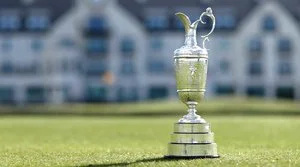The Open Championship concluded yesterday, and it did so in thrilling fashion. If you're not a golfer, the Open Championship (aka The British Open) is one of professional golf's biggest events of the year. One of the four "major" championships. As I followed the tournament, I began to see parallels in golf and investing. While we can draw parallels over the game of golf or the British Open itself, I want to focus on one player in particular: Jordan Spieth, winner of the 2017 British Open.
First, a little backstory: Spieth, just 24 years old, entered the final round with a three (3) shot lead. He had already won numerous times in his short, and very successful, career. He has won major events already, including the Masters (2015) and the U.S. Open (2015). Over the first three rounds, he played smart, almost surgical iron shots into the greens. Combined with other facets of his exceptional game, he was able to produce a nice cushion heading into the final round. His lead was not insurmountable, though. And he had been in a similar position before - April, 2016 at The Masters, where he held a FIVE shot lead with only nine holes to play and lost.
What transpired during the final round was truly incredible, both for golf fans and investors. Spieth quickly saw his lead evaporate via poor play over the first 4 holes. After nearly losing his ball on the 13th hole, he made a miraculous recovery to stay within one shot of the lead. He then proceeded to blitz the final 5 holes with 3 birdies and an eagle, and won The Open Championship by a comfortable 3 shots.
Only it wasn't that comfortable.
So how did he do it? How was he able to control his emotions, overcome adversity and win the Championship? I think it was based on FOUR very important factors that, when combined, can make us better investors:
Emotions
I've covered this in a previous post and it bears repeating. After the final round, Spieth acknowledged feelings of doubt and uncertainty both heading into the final round, and after his lead vanished. This is one of the world's BEST golfers, how can he have feelings of doubt?? It shows we're all susceptible to emotions - even when we're the best in the world at something or watching our investment accounts fall during a market crash. And these emotions can make us do crazy things. How we manage our emotions contributes to the failure or success of an investment plan.
Gameplan
Every golfer, and investor, should have a gameplan. Spieth and his team designed a gameplan that best worked for HIS game. It was designed to mitigate the golf course's risk while maximizing scoring opportunities for HIM. It was designed for four rounds, not one hole or one round. He didn't abandon his gameplan after he lost his lead. In fact, sticking to his gameplan helped him make 3 birdies and 1 eagle over the final five holes to catapult him to victory. An investment gameplan helps us make sound decisions at all times: when it feels like everything else around us is falling apart AND when everything is going according to plan. It also helps us avoid making emotional decisions (see above).
Discipline
We know Spieth had a gameplan heading into the Open Championship, and definitely heading into the 4th and final round. When things began to fall apart and his emotions surfaced, he didn't stray from his gameplan. He knew it was solid, and had produced impressive results over the first 3 rounds. He didn't abandon it during, and after, what was certainly a tumultuous and emotional first 4 holes. This takes discipline. It also takes discipline to stay in the market - because that's what your gameplan says - even when the media and everyone else around you is in a full fledged panic.
Team Approach
On the 7th tee box of the final round, Spieth's caddie provided him with a bit of a pep talk. After the round, Spieth acknowledged it put him in a more positive mindset and helped him overcome his emotions. Golf is certainly an individual sport, but having a team around him helped Spieth handle his emotions, stick to his gameplan, and stay disciplined, even when things weren't going his way. Similarly, having a financial advisor - a teammate, so to speak - can provide many of the same characteristics, traits, and advice to help you handle your emotions, stick to your investment/financial gameplan, and stay disciplined.
Four very important factors helped one of the best golfers in the world win one of his sport's most prestigious Championships. I imagine applying these four very important factors to your financial life can help you, too.

